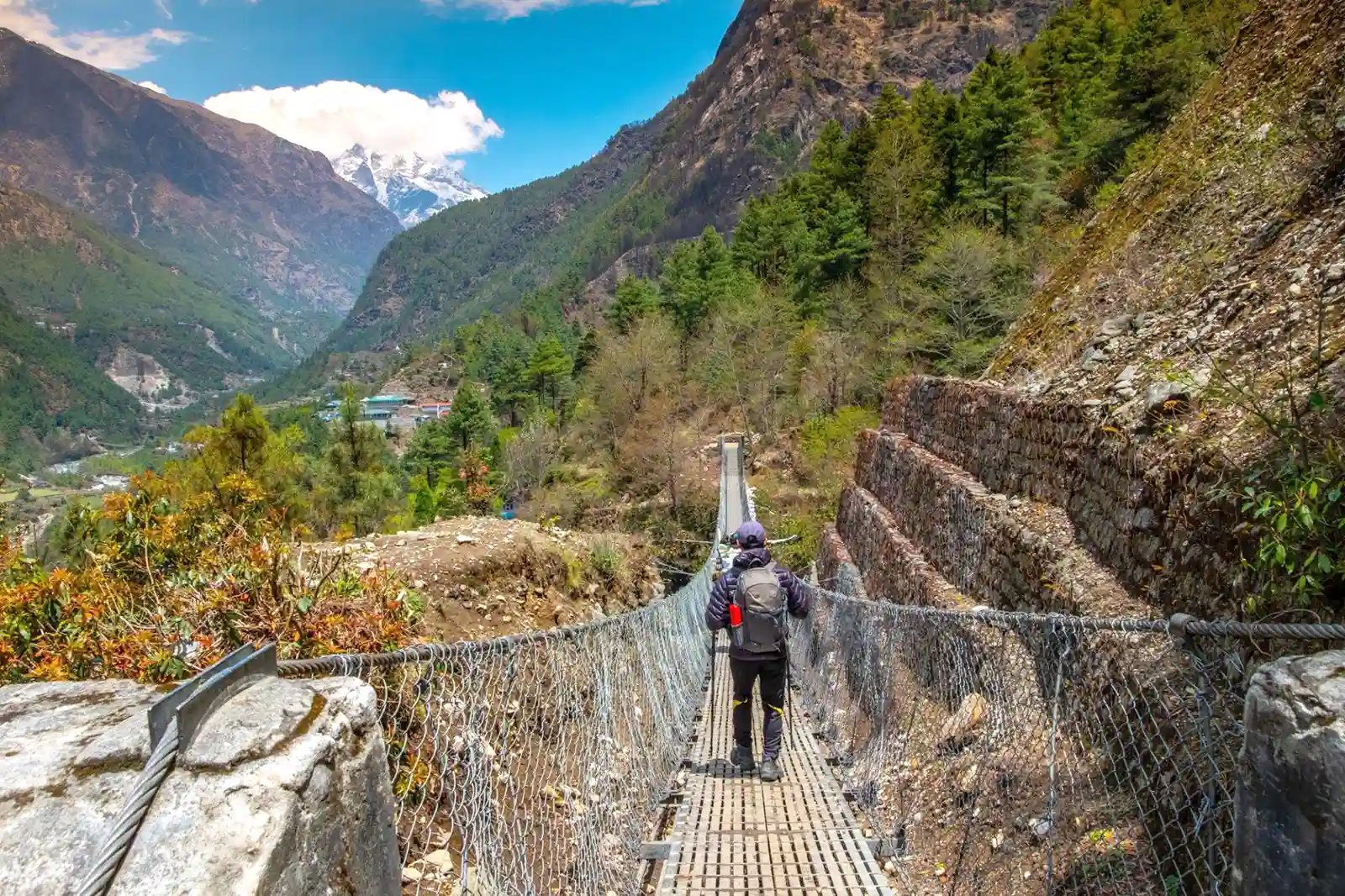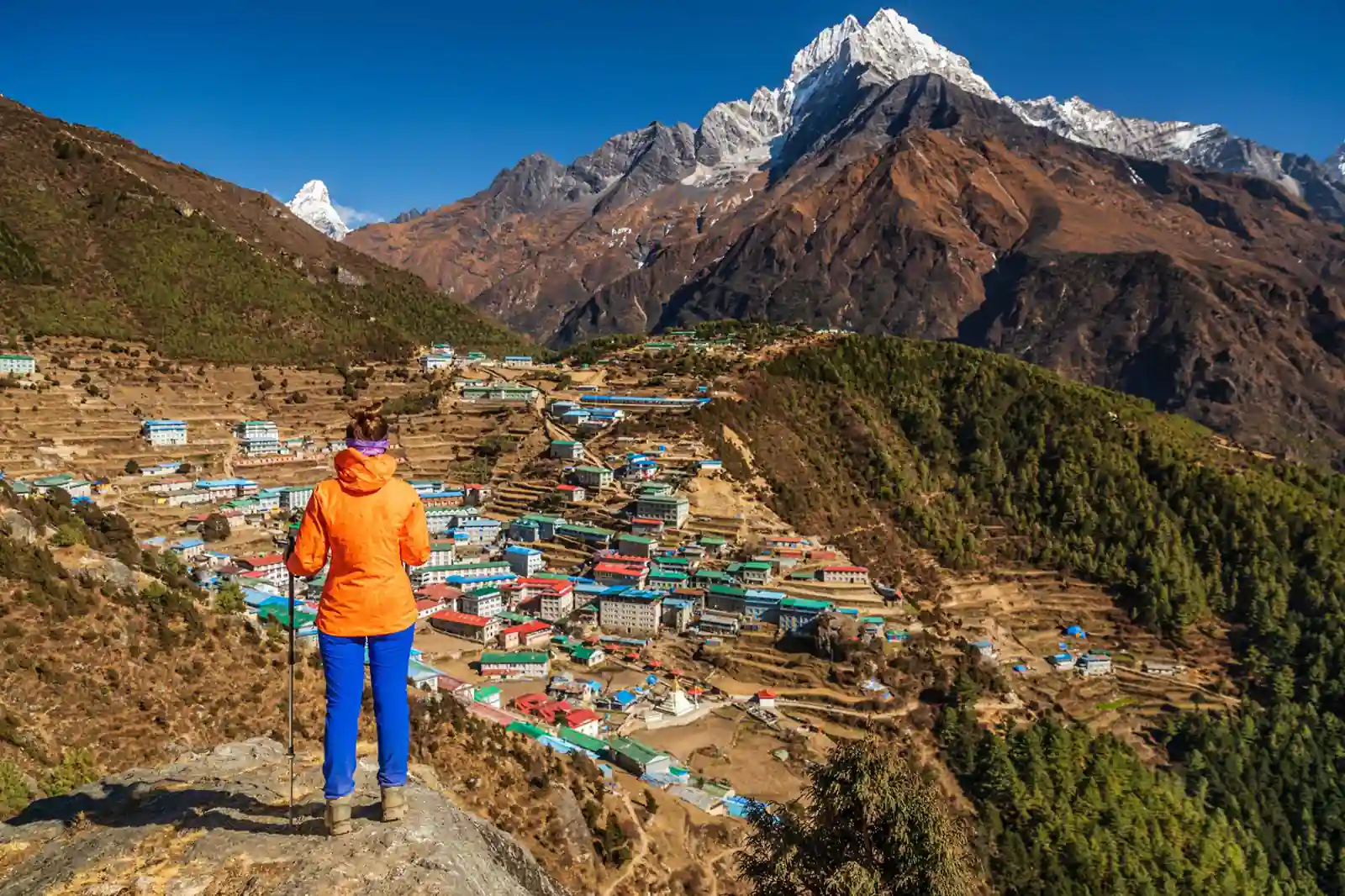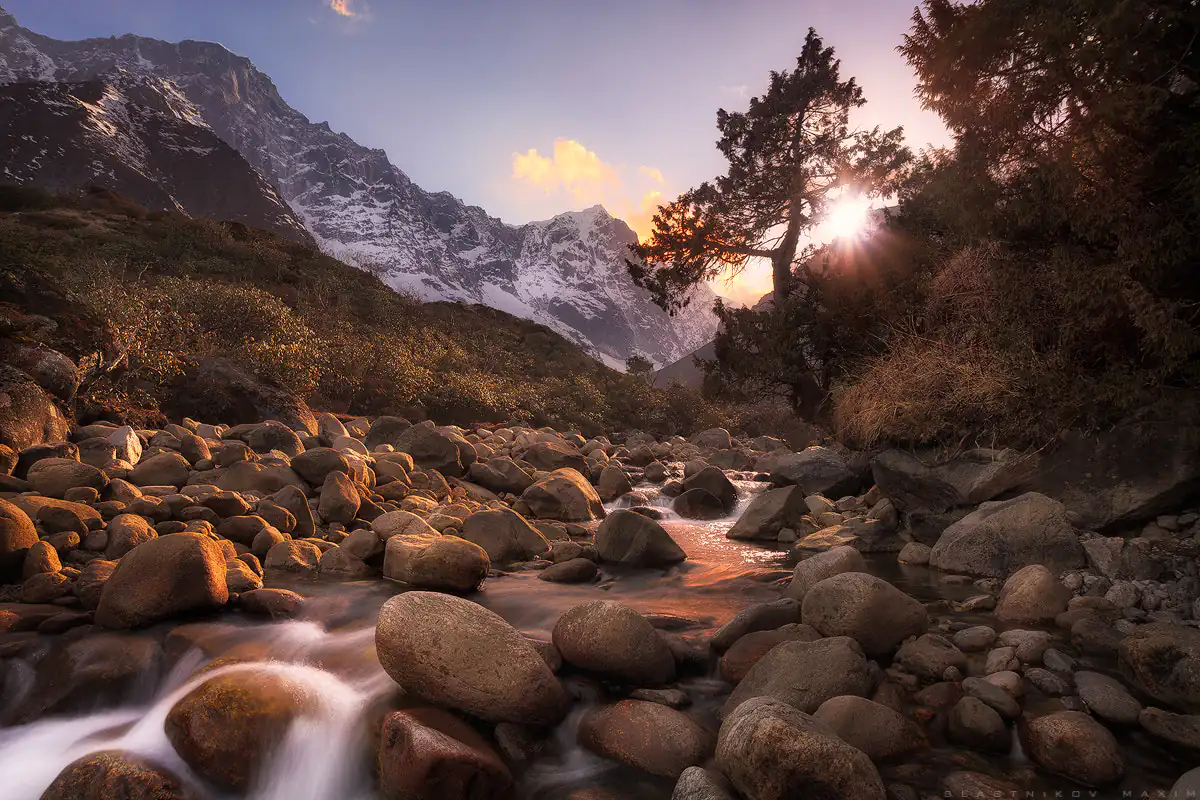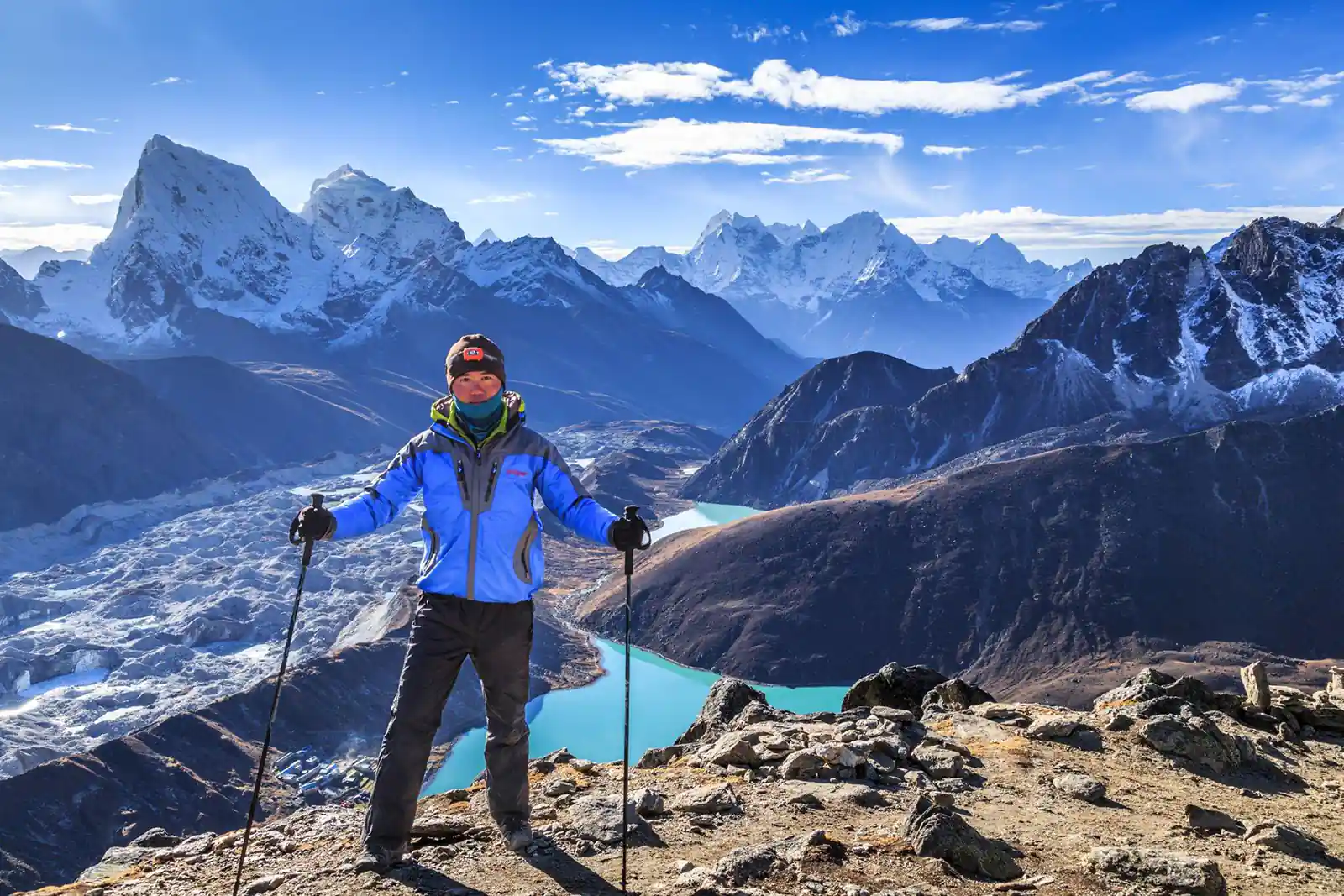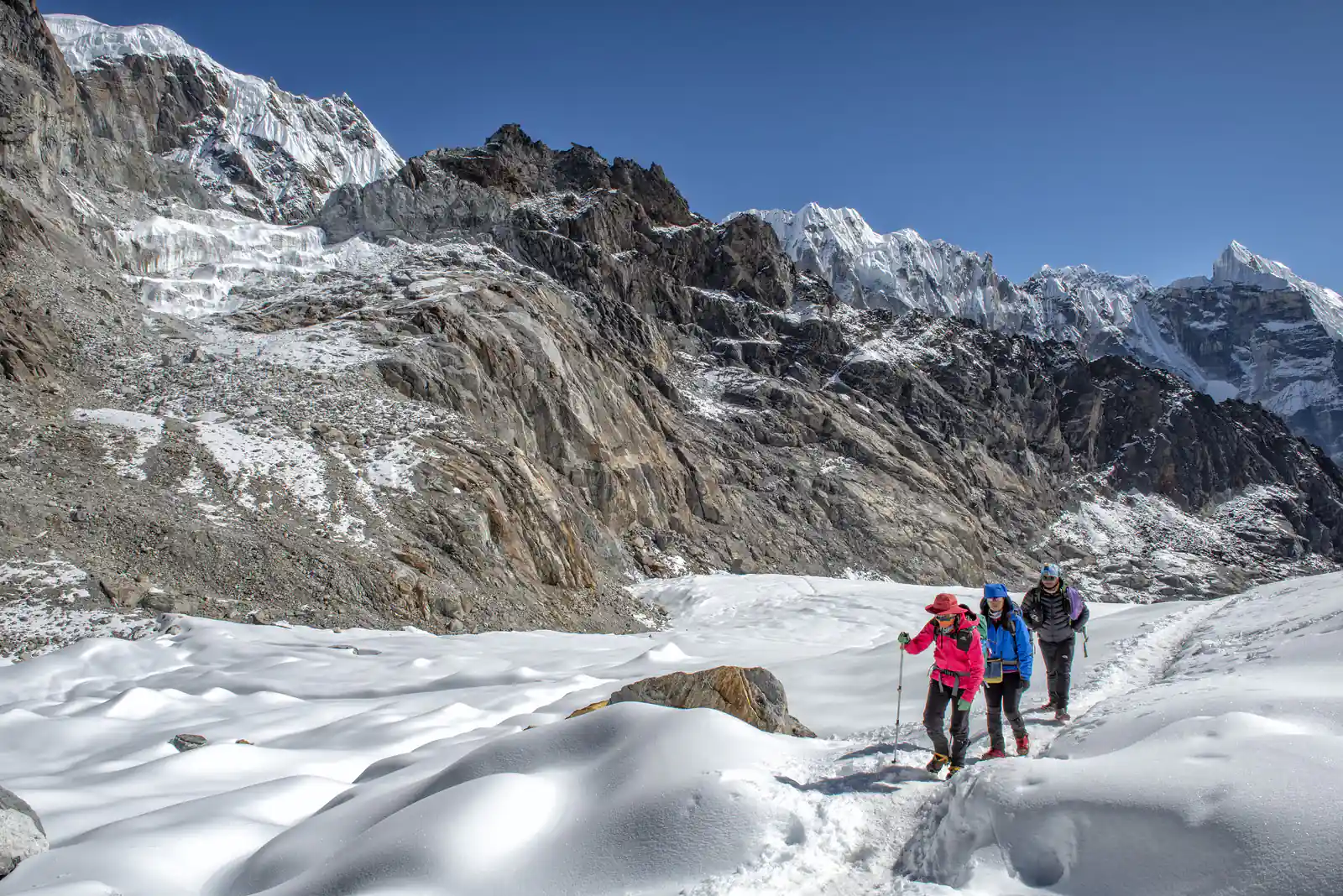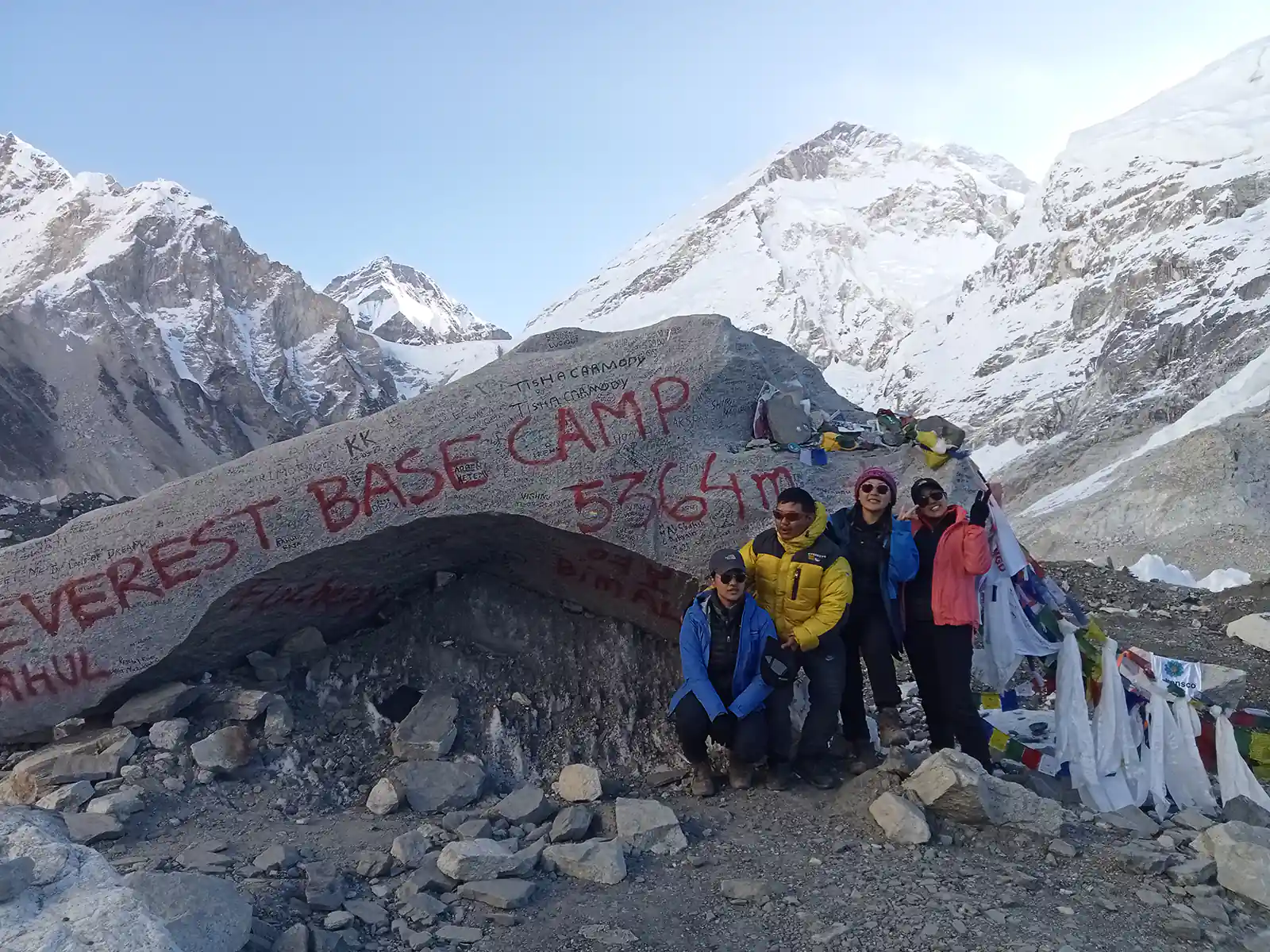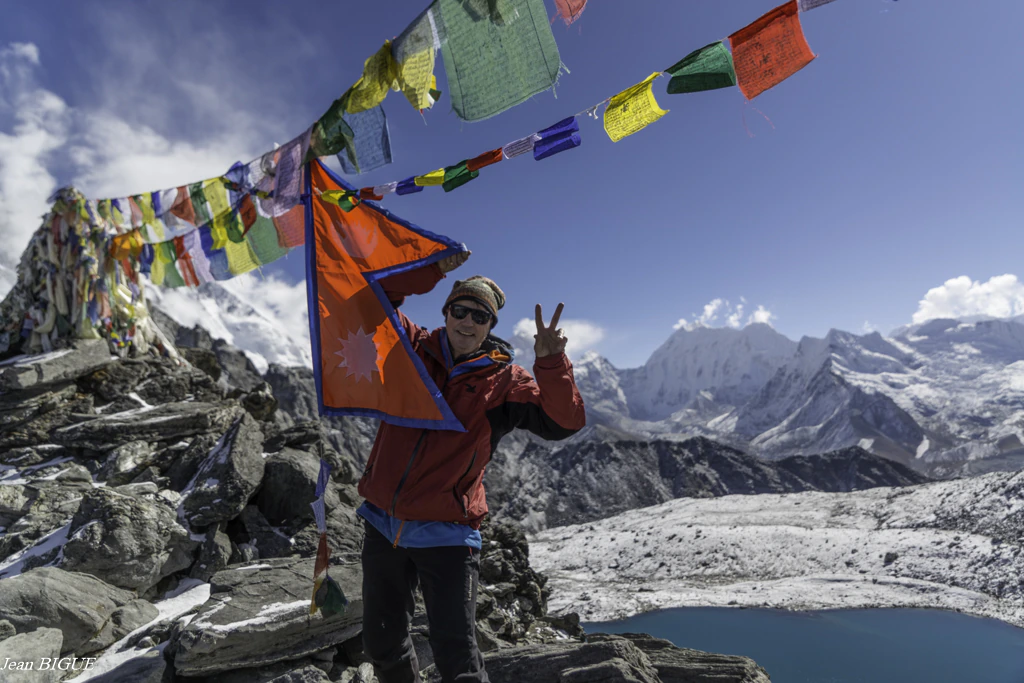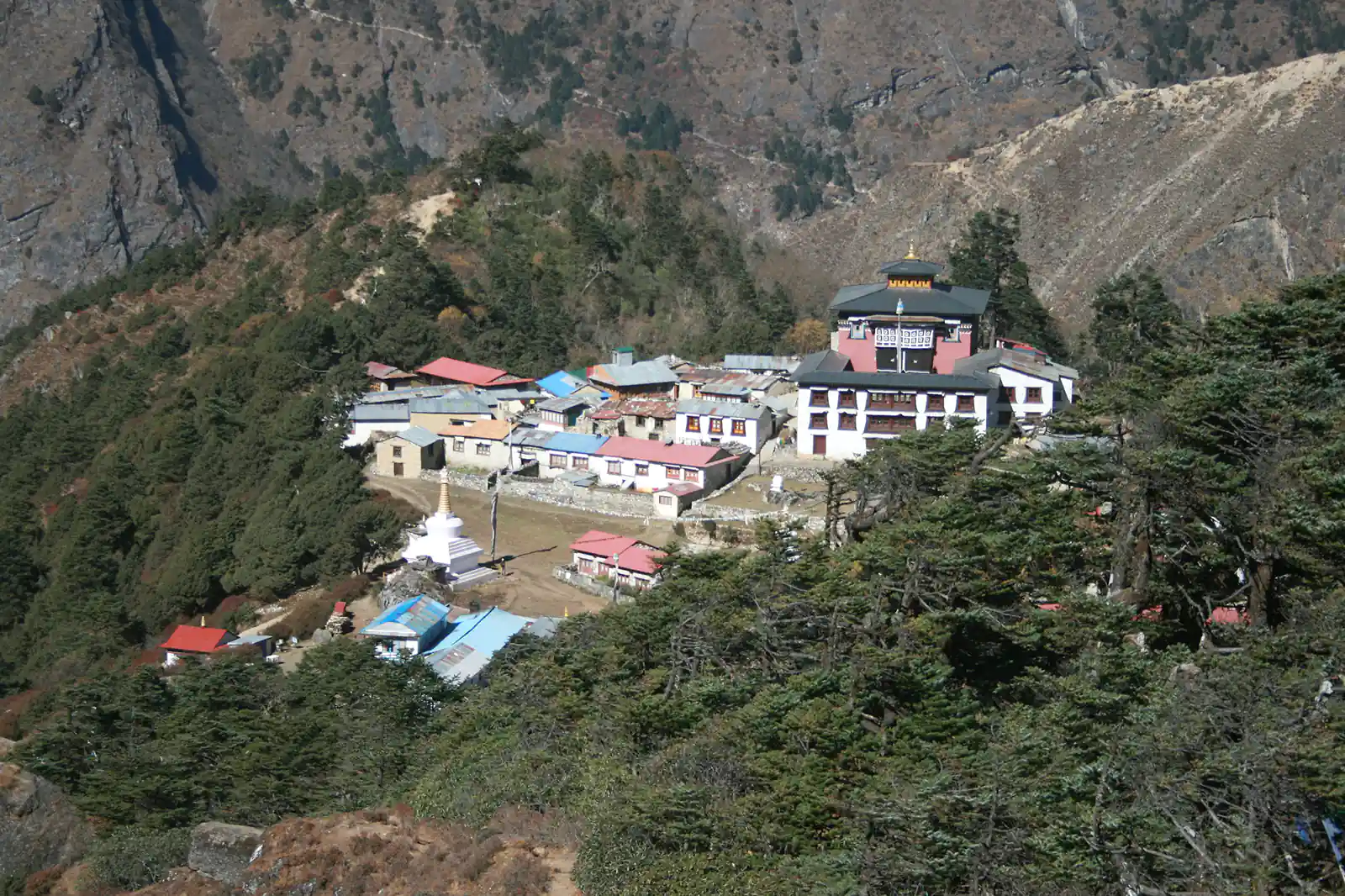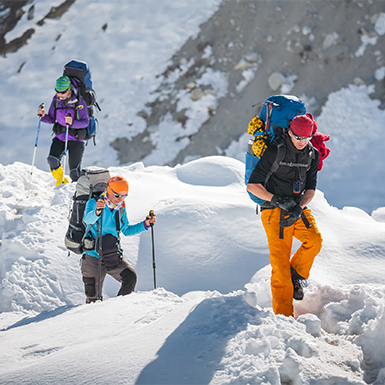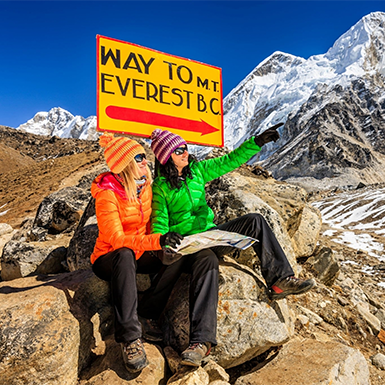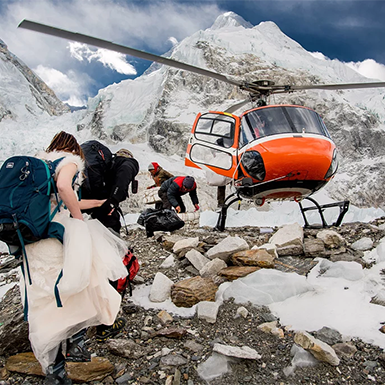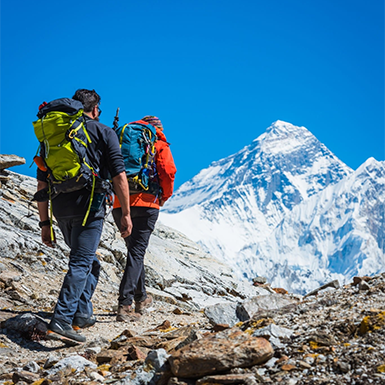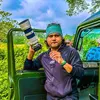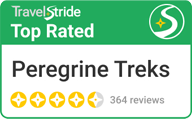- 14 Dinner
- 14 Lunch
- 16 Breakfast
- 03-night hotel
- 15 nights eco-lodge
- Cross the three passes
- Away from the EBC crowd
- Kathmandu Sightseeing
 Destination
Destination Nepal
 Difficulty
Difficulty Difficult
 Max. Altitude
Max. Altitude 5545 Meter Kala Patthar
 Activity
Activity Trekking
 Start/End Point
Start/End Point Kathmandu/Kathmandu
 Best Season
Best Season March, April, May, Sept, Oct, Nov
 Group Size
Group Size 1 - 8 People
 Transportation
Transportation Private Car and Flight
 Activity Per Day
Activity Per Day 6-7 hours trek
Overview of Everest Three Passes Trek
The main attraction of the Everest Three Passes Trek is the three passes – Renjo La (5,446m), Cho La (5,420m), and Kongma La Pass (5,535m). Though it is a very strenuous trek, it guarantees the exhilarating experience of adventure, perseverance, and excitement. Furthermore, the view from the top is spectacular as one can get the closest possible views of Mt Everest, Lhotse, Cho-yu, and Makalu. As the Everest Three Passes Trek is physically demanding, you should take the service of an experienced guide and support staff. The trek takes us to the Everest Base Camp, Kalpattar, Gokyo Lakes system, and Gokyo Ri. Throughout the trek, you can enjoy the majestic view of Mount Everest and other tall peaks.
Everest Three Passes Trek Highlights
- Trek a circuit around the entire Everest region
- Breathtaking views of the highest mountains in the world from different places
- Cross the three passes Renjo La, Cho La, and Kongma La
- Away from the crowds of the EBC trek behind
- Kathmandu Valley Sightseeing
Moreover, the untouched Nangpa La Valley is the other attraction of the trial. Here, you can see Sherpas practicing Tibetan culture and tradition. A visit to Thame, where record-setting Everest climber Apa Sherpa was born, will be memorable for you.
Please note that this trek is the best alternative if you are looking for a peak climbing experience and backpacking in the wilderness. Compared to other trails, this trail is vibrant in terms of activities. The trek spreads to the Chhukung Valley, Ama Dablam Base Camp, and the Everest Base Camp. Besides, after crossing the Renjo La, you enter the Thame Valley, and Gokyo Lakes, enjoying the panoramic view of mountain ranges.
Our team will acclimatize you to the high altitude by walking slowly but steadily to prepare for the climb. You will have rest days at — Namche Bazaar, Dingboche, and Gokyo Lake. Our team will accompany you on a short hike or stroll to the nearby villages.
Why Peregrine for Everest Three Passes Trek
Peregrine Treks Pvt. Ltd. customizes the trek based on your time, group size, and physical strength. So, join our team of experienced guides and support staff to enjoy the unique adventure in the lap of the Himalayas.
Everest Three Passes Trek Detail Itinerary
-
Day 01: Kathmandu Arrival
Peregrine Treks representatives will receive you and transfer you to the hotel at the airport. The Everest Three Passes Trek plan will be discussed and handed to you.
Meals: Not Included
-
Day 02: Kathmandu to Lukla by flight and trek to Phakding
An early morning flight will take you to Lukla Tenzing-Hillary Airport. The mountain flight journey would be a mesmerizing memory in itself. The close view of the mountain range and hills of the Khumbu region and rural Nepal can be savored from the flight.
Suspension bridge on the trekking route from Lukla to Phakding Once landed in Lukla, the Everest Three Passes Trek starts after meeting the rest of the support crew. The day’s trekking would be up to the Phakding.
Meals: Breakfast, Lunch, and Dinner
-
Day 03: Trek to Namche
Phakding to Namche is a relatively easy trekking time spanning up to 3 hrs. The trail comprises a suspension bridge with colorful prayer flags on it. The views of the Mountains start to welcome you towards its lap. The highlight of this part of the trail would be the Tibetan wall paintings and the occasional pictures of the Mountains.
Meals: Breakfast, Lunch, and Dinner
-
Day 04: Acclimatization day in Namche
Early morning breakfast at the hotel and to Everest View Hotel. Everest Base Camp trekking requires strength and endurance as well as willpower. The day’s rest will be taken in Namche to prepare for the trek upwards.
Woman looking at Namche Bazaar from above The acclimatization hiking will take place as you will be taken to the world’s highest-located hotel, the Everest View Hotel, after Breakfast. The panoramic views of the mountains and the hotel’s surrounding area are splendid. It is highly recommended that the trekkers go through the acclimatization hiking as it prepares their body and soul for the trekking.
Meals: Breakfast, Lunch, and Dinner
-
Day 05: Namche to Thame
After breakfast, we will embark on an exciting journey alongside the mesmerizing Bhote Koshi River. Our scheduled itinerary today entails venturing to the charming village of Thame. This village is located in the scenic Khumbu Valley. It is known for its unparalleled picturesque beauty. This journey will allow us to witness the verdant and dense pine and rhododendron forests.
En route, we will observe Phurte’s mud-plastered stupa. It is a remarkable sight that will leave a lasting impression. Our expedition will also include a break at the quaint Thamo village. Here, we will visit the awe-inspiring Thamo Gompa. It is a Buddhist monastery with remarkable architectural prowess.
Sunset at Thame As we progress, we gradually descend towards the Khumbu Hydroelectric Plant, an essential infrastructure in powering the region. Our journey will conclude in the last settlement of the valley, Thame. Here, we will indulge in a comfortable and restful stay at one of the local lodges.
Elevation: 3750 m
Trek Duration: 6 hours
Meal: Breakfast, Lunch, and Dinner
Accommodation: Local Guest House -
Day 06: Thame to Lungden
Today, we will journey through picturesque villages with awe-inspiring vistas of verdant landscapes and majestic mountains. As the sun ascends, its rays cast an ethereal glow upon the rocks, lichens, yaks, and snow-capped peaks. Our trek will lead us through Taranga, the last village in the valley, and onwards to Marulung village, situated at an altitude of 4200m.
Finally, we will arrive at Lungden, the designated resting place for the day. During leisure hours, we may explore the Nakpa Valley, an ancient trade route to Tibet, or opt for a rewarding hike to Cho Relmo Lake. We will lodge at one of Lungden’s local lodges.
Elevation: 4500 m
Trek Duration: 6 hours
Meal: Breakfast, Lunch, and Dinner
Accommodation: Local Guest House -
Day 07: Lungden to Renjola Pass to Gokyo
Our day today is characterized by a palpable anticipation as we gear up for the first-ever Renjola Pass crossing. It is a crucial intersection on our path. Our departure from Lungden sets the stage for our journey’s next leg, which will take us to the stunning Gokyo Lakes area. Depending on the season, we may observe many human activities, including managing yak herds.
Panoramic view of Mount Everest (8,848 m) with Himalayan range view from the top of Renjo la pass (5,340 m) Upon arrival at the Renjo La Pass, an awe-inspiring panorama of towering peaks will unfold, such as the mighty Mount Everest, Mount Lhotse, Mount Makalu, and Mount Cho Oyu. Adding to the breathtaking vista is the sight of the third central lake of the Gokyo region – Dudh Pokhari. The charming Gokyo village is nestled alongside its tranquil waters. As we embark on the path leading into the Gokyo Valley, we must be cautious as icy conditions may prevail along some trail stretches.
Elevation: Renjola Pass- 5446 m, Gokyo- 4750 m
Trek Duration: 8 hours
Meal: Breakfast, Lunch, and Dinner
Accommodation: Local Guest House -
Day 08: Gokyo Ri to Thangnak
Our day today comprises a challenging trek along a demanding path that winds near the Ngozumpa Glacier. The trail presents varying elevations and rocky terrain. Consequently, we must be prepared to navigate it. The awe-inspiring panoramas we will behold along the way will undoubtedly stimulate our determination to persist.
Our descent into the valley will present us with magnificent vistas that will leave us breathless. Our destination is the idyllic cluster of lodgings referred to as Thangnak. This village is an oasis of serenity that provides a peaceful haven for those seeking to traverse the Cho-La high pass.
Elevation: 4700 m
Trek Duration: 5 hours
Meal: Breakfast, Lunch, and Dinner
Accommodation: Local Guest House -
Day 09: Thangnak – Chola Pass – Dzongla
The itinerary for today comprises a challenging hike over formidable terrain fraught with rocky paths and glacial moraines. Our ultimate destination is the picturesque hamlet of Dzongla. We can access this village by traversing the awe-inspiring Cho La Pass that connects it to Thagnak. Upon reaching the zenith, a sublime panorama awaits before we descend to Dzongla. Here, we can recharge ourselves with a much-needed respite.
Crossing Chola Pass Elevation: Chola Pass- 5420 m, Dzongla- 4855 m
Trek Duration: 6 to 7 hours
Meal: Breakfast, Lunch, and Dinner
Accommodation: Local Guest House -
Day 10: Dzongla to Gorakshep
Today’s itinerary entails a challenging hike to reach Gorakshep via Lobuche. Our day will begin with a traverse along the rugged moraine, descending alongside the resplendent Chola Lake. During this journey, we will encounter several commemorative statues along the way, where we can pay our respects to the courageous climbers who have lost their lives in this region,
As we continue our trek, we will follow the well-marked trails of Imja Khola Valley, culminating in our arrival at Lobuche. We will briefly interlude to revitalize minds and bodies before proceeding to our next destination.
Subsequently, we will traverse the Westside of Khumbu Glacier. Here, we must navigate past the winding moraine to reach our ultimate destination, Gorak Shep. This will serve as our overnight base. Here, we will have the opportunity to revel in the natural beauty of the surroundings.
Elevation: 5185 m
Trek Duration: 6 to 7 hours
Meal: Breakfast, Lunch, and Dinner
Accommodation: Local Guest House -
Day 11: Kala Patthar – EBC – Lobuche
As dawn breaks, we will embark upon a challenging expedition toward the apex of Kalapatthar, the highest peak of our trek. Our path towards this magnificent natural wonder lies north of Gorak She. After a two-hour ascent, we will finally arrive at our destination.
This sought-after location is an absolute must-see for avid nature enthusiasts keen on exploring the Himalayas of the Khumbu region. The site offers an awe-inspiring 360° vista of the surrounding terrain. The sunrise view here will tantalize your senses and leave you yearning for more.
Everest Base Camp After some time at Kala Patthar, we will descend towards Gorakshep. Here, we will partake in a nourishing breakfast. Then we will venture forth to our much-anticipated destination of EBC. We will hike along the Khumbu Glacier with a gradual ascent in elevation, culminating in our arrival at the base camp.
While occasionally presenting moderate challenges, the incline remains a gentle slope devoid of any notably steep ascents. Then the path will curve inward, unveiling a stunning array of prayer flags and the legendary rock that signifies our arrival at Everest Base Camp.
After exploring the scenic beauty of EBC, we will head back to Gorakhsep. From there, we will embark on a thrilling hike toward Lobuche, where we will spend the night.
Elevation: Kala Patthar- 5555 m, EBC-5364 m, Lobuche- 4930 m
Trek Duration: 7 to 8 hours
Meal: Breakfast, Lunch, and Dinner
Accommodation: Local Guest House -
Day 12: Lobuche to Kongma La Pass – Chukhung Valley
Today’s expedition involves navigating through the last of three mountain passes on our predetermined route. It is acknowledged as the most arduous of the three. Our journey towards the Kongma La Pass is relatively effortless. A spectacular display of frozen lakes will adorn our path. Upon reaching the pinnacle of the pass, we will see a panoramic vista of awe-inspiring peaks. They include Lhotse, Shar, Makalu, Baruntse, and Ama Dablam.
Kongma La pass We will then descend from the majestic Kongma La pass towards the eastern region of the Nigyang Khola Valley. While en route to the Chukhung Village, we will relish this picturesque hamlet’s exquisite charm amid the Himalayas. We will stay for the night in this village.
Elevation: Kongma La Pass- 5535 m, Chukung Valley- 4730 m
Trek Duration: 7 to 8 hours
Meal: Breakfast, Lunch, and Dinner
Accommodation: Local Guest House -
Day 13: Trek to Tengboche
As we traverse the Imja Khola valley, we will encounter the delightful hamlet of Dingboche. This village is famous for its remarkable stone-walled potato fields and vast alpine meadows. Advancing on our journey, we will see a panorama of Kharkas. We will also encounter traditional highland enclosures at Tsura, Orsho, and Shomare along the way. These structures are indispensable as domiciles for local herders and their fauna.
Tengboche Monastery We will then traverse the Pangboche Village. This village is a peaceful settlement blessed with a temperate climate all year round. From here, we will reach Tengboche. It is a veritable paradise that affords us panoramic vistas of the majestic peaks that envelop the area. Tengboche allows us to bask in the resplendence of iconic mountain ranges. Such as Amadablam, Everest, Nuptse, and Lhotse.
Elevation: 3855 m
Trek Duration: 5 hours
Meal: Breakfast, Lunch, and Dinner
Accommodation: Local Guest House -
Day 14: Trek to Namche
As we head to Namche Bazaar, we will traverse through verdant woodlands that teem with plenty of alpine fauna, including pheasants, musk deer, mountain goats, and the elusive snow leopard. The journey to the bazaar requires navigating steep inclines adorned with sacred chortens and colorful prayer flags. The trail boasts breathtaking panoramic vistas of Everest and Lhotse.
Elevation: 3440 m
Trek Duration: 5 hours
Meal: Breakfast, Lunch, and Dinner
Accommodation: Local Guest House -
Day 15: Trek to Lukla
Today, we return to Lukla, the final day of our trekking expedition. Our morning will commence with a satisfying breakfast. Then we will embark on a rigorous descent down a steep trail, culminating at the revered Hillary Suspension Bridge. We will then proceed through a succession of local villages along the glorious Dudh Koshi River Valley. After a full day of exploration, we will arrive at the restful haven of Lukla, where we can indulge in the cozy comforts of our lodgings for the evening.
Elevation: 2850 m
Trek Duration: 6 to 7 hours
Meal: Breakfast, Lunch, and Dinner
Accommodation: Local Guest House -
Day 16: Fly to Kathmandu
As the early morning sun rises, we are set to return to Kathmandu’s vibrant city. Our 40-minute flight will be a serene journey. It will offer us panoramic views of the awe-inspiring landscape surrounding us. Witnessing the gradual terrain transition, we will experience a sense of calm and rejuvenation as we approach our destination.
Elevation: 1400 m
Flight Duration: 40 min
Meal: Breakfast
Accommodation: 3-star hotel -
Day 17: Departure
Today marks the culmination of your journey in Nepal. We are privileged to extend our support by facilitating your safe and comfortable departure from the country. Our team will ensure you reach the airport three hours before your flight.
Includes/Excludes
What's included
- Airport pickups and drops in a private vehicle
- Bed and Breakfast in a three-star category hotel in Kathmandu
- Room in the best available lodge and all meals (Breakfast, Lunch, and Dinner)during Everest Three Passes Trek
- All ground transportation in private vehicles as per itinerary
- Kathmandu – Lukla – Kathmandu flight tickets
- Full-day guided sightseeing in a private vehicle
- All entrance fees during sightseeing and trekking
- An experienced English or other Language speaking guide and one assistant guide for more than five trekkers
- One porter for two trekkers
- Guide, porter, and necessary staff salaries, insurance, accommodation and food, and airfares if necessary
- Peregrine Treks and Expedition’s Duffel bag, t-shirt, achievement certificate, and trekking map are free services from the company.
- Everest Three Passes Trek Permit and TIMS
- First Aid Medical Kit or essential medicine
- Seasonal fruits during the trek
- Farewell dinner
- In the worst case, search and rescue service arrangement
- All applicable government and local taxes
What is excluded
- Nepalese visa fee and International airfares
- The excess weight of luggage charge(s) in the flight
- Extra Hotel accommodation, Lunch, and Dinner in Kathmandu because of an early arrival in Nepal or late departure from Nepal before return from Everest Three Passes Trek.
- Travel and rescue insurance for trekkers only.
- Personal expenses (phone calls, laundry, soft or hard beverages, recharge the battery, bottled/boiled water, extra porters, hot shower, a pot of tea, etc.) during trekking
- Tips and gratuities for guide(s), porter(s) and driver(s)
Accommodation
You will stay in Samsara Resort or Hotel Arts Kathmandu during your Everest Three Passes Trek. A solo traveler needs to share the room with a same-gender traveler. If you need a single supplement, you will have to pay an additional cost of about USD 200. Most of your accommodations during the trek contain attached bathrooms, while some teahouses may not have, and you may have to share the washing and toilet facilities. Kathmandu and the trekking regions will have sing room facilities in lower elevations, but it will be hard to find them at higher elevations.
Meals
During your trek, you will enjoy typical Nepalese food and international cuisine (Tibetan, Continental, Indian, etc.). Be sure that the lodges or teahouses will provide breakfast, lunch, and dinner as per their available menu. You may not be served breakfast somewhere during your Everest Three Passes Trek. You may get opportunities for welcome and farewell dinners for guests.
Departure Dates
Customize this trip with help from our local travel specialist that matches your interests.
Quick Inquiry Form
Good to Know
We accept major currencies such as the US Dollar, the Great Britain Pound, the Euro, the Australian Dollar, the Singapore Dollar, the Indian Rupee, the Swiss Franc, the Canadian Dollar, the Japanese Yen, the Chinese Yuan, the Saudi Arabian Riyal, the Qatari Riyal, the Thai Baht, the UAE Dirham, the Malaysian Ringgit, the South Korean Won, the Swedish Kroner, the Danish Kroner, the Hong Kong Dollar, the Kuwaiti Dinar, and the Bahrain Dinar.
Type C, D, and M power plugs and sockets are used. The standard voltage and frequency are 230 V and 50Hz, respectively.
Vaccinations You must be completely vaccinated against COVID-19 at least 14 days before traveling to Nepal. Vaccination documentation is required.
On Arrival Visas are available at Nepal's entrance points for travelers. Travelers from Nigeria, Ghana, Zimbabwe, Swaziland, Cameroon, Somalia, Liberia, Ethiopia, Iraq, Palestine, Afghanistan, and Syria, on the other hand, are required to obtain a visa through their nearest Nepalese diplomatic post (embassy/consulate).
Tourist Visa Fee
15 Days – US$ 3030 Days – US$ 50
90 Days – US$ 125
To confirm the trek/tour package, we want a deposit of at least 20% of the total tour/trek fee. The remaining balance must be paid when you arrive in Nepal. We take Visa, Maestro, MasterCard, American Express, and other major credit cards. The total cost of a Bhutan and Tibet tour must be paid in full at the time of booking.
We strongly advise you to purchase a SIM card for reliable internet access throughout Nepal. Nepal Telecom (owned by the government) and NCELL (owned by the private sector) are the two main SIM card providers in Nepal. It is preferable to get a SIM card at an airport, where staff will assist with activation and data plan purchases. If you have a SIM card, it will be easier for you to contact us and locate our airport agent.
You can charge your electrical devices at hotels and lodges because there are no power outages. In the Himalayan region, however, hotel owners may levy a nominal fee.
Essential Information
Accessing this Everest Three Passes Trek
With a flight to Lukla or a trek from Salleri, we can access this Everest Three Passes Trek. The accessibility of the scenic hub – headquarters of the Solukhumbu Region depends upon the quality of the roads. However, they can be accessed by flight too. Adding four days to the trip would be a prelude to the major climb ahead.
Trip Difficulty
The Everest Three Passes trail is moderately challenging. Without any technical complexities, the trek doesn’t require ropes or other sophisticated equipment. While the climb may entail traversing small hills or peaks such as Kala Patthar or Gokyo Ri, these can be easily avoided. Although you may encounter some steep slopes, they can be surmounted with a secure footing. Therefore this trek is accessible to individuals with prior mountain hiking experience and robust physical and mental health.
Although, you must remember that high altitudes can be unpredictable. The weather conditions may shift without warning. Such sudden changes may significantly impact your planned route. Consequently, you must have adequate preparation and flexibility. While Kongma La represents a relatively short passage, the other two passes – Cho La and Renjo La – may pose more substantial challenges due to their susceptibility to sudden weather variations. While such occurrences are rare, it is crucial to remain vigilant and anticipate any eventualities that may arise.
Best time to go to Everest Three Passes Trek
Hiking the famed Everest Three Passes is a viable option throughout the year. However, the optimal periods to embark on this trek are spring (March to May) and autumn (September to early December). During this time, the weather conditions are most favorable. Trekking during these seasons provides an unrivaled experience of the breathtaking landscape and mountainous terrain.
The months of September through May offer a dry climate, which enhances the visual splendor of the mountains. September to November is delightful, with clear skies and panoramic views. Even as late as December, the weather remains agreeable, and the vistas are still quite spectacular. Another opportune time to engage in this trek is from March to June, as the weather is stable during this season.
During the winter months, from late December to February, the low season presents an opportunity to experience tranquility in the region. However, visitors must be mindful of the frigid temperatures during the evenings.
Alternatively, the summer months between June and August coincide with the monsoon season. This season is generally not advised for the Everest three passes trek. Nonetheless, the allure of trekking during this period lies in the opportunity to encounter a few fellow trekkers. Trekkers can engage with locals more leisurely and observe nature in splendor.
Altitude Acclimatization
Trailing up to 2500 m can increase the risk of Acute Mountain Sickness (AMS). Altitude Acclimatization is the key to avoiding acute mountain sickness. Do a slow climb to help your body acclimatize. Drink plenty of liquid-like garlic soup that helps the body with the process. Drugs like acetazolamide (also called Diamox) help the body maintain the amount of oxygen. However, our trip itineraries are designed considering the time for the acclimatization of the human body.
Trip Safety
Your safety is always our priority. Our trips are well-planned too. Take every precaution in mind. The team will have cell phones, emergency satellite phones, extensive medical kits, and other necessary apparatus. You will always be in connection with our Kathmandu office. Our team makes sure you are safe throughout the trip. Pre-trip Passesstration, such as compulsory medical questionnaires and travel insurance, is all done keeping your safety in mind.
Fitness Level
Everest Three Passes Trek requires a reasonable level of fitness maintained. One must be used for some exercise. However, porters and animals will carry your gear and sleeping bags. So your daily pack will be light, and just the altitude trail can seem a significant issue. We walk daily, and with days, you must feel fit and healthy and push your limits. We expect our fellow participants to get used to exercising and training hard before the Everest Three Passes Trek. However, we design our treks equal to every gender or age. We believe that trekking is not a race and a collective trail. So there is equal participation of all the trekkers.
One typical day
Each day, your day begins at an early hour. After breakfast, you will embark on a moderate trek of 4 to 6 hours. En route, you will encounter many cultural landmarks, such as stupas, monasteries, mountains, villages, and forests, all while traversing the Dudh Koshi River. You will take a brief intermission during the afternoon for nourishment and refreshment. After rest, the trek will continue until you reach the planned destination for the day. You can then spend the remaining time exploring the surrounding settlements. Or, you can climb short hills and peaks following the itinerary.
In the evening, comfortable lodgings await you, complete with a delectable meal. The dawning sun will reveal vistas of majestic peaks that will leave you in awe. As night descends, a sober view of the celestial sky will be yours to enjoy, free from the intrusion of urban light pollution.
Before you go
Before embarking on your journey, you must remember the potential for altitude sickness to manifest at elevations exceeding 2,400 meters above sea level. Symptoms may include debilitating headaches and a pervasive sense of discomfort. Nevertheless, this affliction can be effectively forestalled by implementing specific preventative measures such as:
- Stay hydrated and drink 3 to 4 lt of water
- Acclimatize appropriately as specified by your agency
- Walk slowly and steadily
- Carry Diamox (medicine for such sickness)
- Avoid consuming alcohol, coffee, or soft drinks
- Have garlic soup and ginger tea
Additionally, obtaining comprehensive travel insurance for your upcoming journey is essential. Acknowledging the potential risks of altitude sickness and the challenging terrain of trekking paths is essential. Travel insurance can provide valuable assistance and support if you experience any injury or illness during your travels.
Before embarking on this trek, verify that your insurance policy provides coverage equal to or exceeding a 5000 m barrier. The journey entails ascending to Kala Patthar and Gokyo Ri and a brief excursion to Everest Base Camp. Given the unpredictable weather conditions, helicopter evacuation may be deemed necessary. The insurance policy’s cost primarily depends on the traveler’s age, length of stay, destination, and level of insurance coverage. It is recommended that a minimum coverage of USD 10,000 be secured for this specific type of trek.
Flight Delays in Kathmandu and Lukla
Lukla Airport is situated in a beautiful valley surrounded by mountains. Therefore, a flight taking off and landing are considered difficult sometimes. The weather is unpredictable and can change every few hours resulting in flight delays and cancellations.
Twin Otter and Dornier planes are the main transportation from the airstrip at Lukla. Their service is very much reliable. However, if any delays or cancellations occur due to the weather conditions, we will help you incorporate a helicopter that can carry 4-6 persons at a time. This can cost an extra US $500 to $3000 per person, depending upon the number of passengers. The participant must pay the cost at the time of service. Later, it can be submitted for reimbursement through a travel insurance company. US dollars, cash, or credit cards (Master Cards, Visa Cards, and American Express) are accepted for the helicopter service. All payments require a 4% bank fee directly to the bank.
The helicopter can fly if the visibility is 1500 or higher. Twin Otter and Dornier fly if the clarity is 5000 or higher per Nepal Civil Aviation rules. The helicopters are not operated if extreme weather and visibility exceed 1500. We will schedule the flights to the nearest date available in such cases. If the weather worsens daily, we will provide alternative trek options.
Note:
It is recommended that you buy yourself some extra days. Arrive in Kathmandu a day before the departure date. You can use the extra day to purchase equipment and gear and rest before the great trail you’re up to—buying you some spare time after the trek will cover up if the flight from Lukla to Kathmandu is delayed canceled due to unfavorable weather. So the extra days will help you not to miss your International flight.
During our trip, there may be various political, climatic, and other factors beyond our control and have a chance of altering our itineraries. Although the alteration may not happen significantly, if necessary, the leader will decide the best alternative considering the group’s interests. If any change is made, we ensure it has a minor effect on our itineraries and plans. However, we cannot be responsible for the result of delays in such cases.
Frequently Asked Questions
You can carry out this trek easily if you are in optimal physical and mental condition. Before embarking on this trek, a comprehensive regimen is necessary, such as cycling, walking, or running for several hours daily. This will prepare the body for extended periods of hiking through snow-covered paths and dense forests. Basic training in trekking poles, axes, or crampons is also strongly advised. Such training facilitates safe navigation of steep mountain slopes.
This trek has no age restrictions. However, due to the rigorous nature of the journey, it is recommended for individuals aged 16 and above. Those between the ages of 60 and 70 are also welcome to participate, provided they are in optimal physical condition.
You need the Everest National Park permit, and the Khumbu Rural Municipality permit for this trek. The national park permit can be obtained at the Monjo Park entrance gate or through Kathmandu’s Tourist Service Center office, which is included in your package.
We have meticulously designed our trekking itinerary incorporating rest days and acclimatization periods. Giving our guests the best opportunity to enjoy their experience without any hindrances. Our team of highly skilled and knowledgeable guides has undergone extensive training. They will be with you every step of the way to offer their expertise and support. By adhering to our carefully curated itinerary and heeding the advice of our guides, you can embark on this trek with utmost confidence.
The Everest Three Passes trek has been thoughtfully crafted for those with the luxury of time. It is suitable for those who wish to explore the three main gateways of Sagarmatha: Thame, Gokyo, and Chukhung. This trail grants hikers access to less frequented valleys than other routes in Nepal. Furthermore, comfortable accommodations in lodges await trekkers at the end of each leg. The trek does not require technical equipment like ropes; therefore, it is more accessible and feasible than the classic EBC route.
Our recommendation for obtaining safe drinking water is to employ water purification techniques, such as water purification medications, filter machines, and applying Ultraviolet radiation (Steripen). The adoption of these methods will effectively minimize environmental pollution. We expressly discourage the consumption of melted water.
Reviews
Based on 7 Reviews

United States
Excellent
Lifetime Memory
My best friend and I were stoked to join Peregrine on this epic trek. The level of expertise, warmth, and rapid response to our endless stream of queries blew us away! Every single member of their team was exceptional – from greeting us at the airport to bidding us farewell. They made us feel like one big happy family! I wouldn’t hesitate to go on this adventure all over again. Thank you, Peregrine, for an unforgettable experience!

Australia
Excellent
Beyond Amazing Trek
Our trek with Peregrine was beyond amazing! I can’t stress enough how well-organized everything was – from transfers to accommodation to permits. And our guide? Let’s just say they were a superstar. They made sure we were all acclimatized and confident in our abilities to complete the trek successfully. The whole experience was just incredible, and I highly recommend Peregrine to anyone who wants to tackle the Everest three passes trek. Thanks for a truly unforgettable adventure!

England
Excellent
Incredible Team of Peregrine
I just returned from an incredible adventure trekking through Everest Three Passes with Peregrine Treks. These guys were amazing; they took care of every detail to ensure my trip was a complete success. If you’re thinking about doing this trek, I can’t recommend Peregrine Treks enough – they’re the perfect travel company to go with!

France
Excellent
Fantastic Experience
I just had the most incredible adventure with Peregrine Treks and Tours! In May of 2022, I hiked the Three Pass route + Everest Base camp, and it was absolutely life-changing. I can’t even describe how rewarding and inspiring it was – I feel like a new person! And let me tell you, the organization was top-notch. Even when we faced a few challenges along the way, the trip was still completely safe, well-planned, and enriching. I can’t recommend this experience enough!

Germany
Excellent
Perfect Trek
I can’t even begin to express how incredible the Everest Three Passes trek was. It was an experience I would never forget – all thanks to the amazing team at Peregrine Treks! Our guide was an absolute gem, always knowledgeable, friendly, and patient. I must give a special thanks to Pradip, who went above and beyond to ensure our trip was perfect. There wasn’t a single hiccup from start to finish, thanks to the exceptional organization of Peregrine Treks. I can’t recommend them enough!

Poland
Excellent
Challenging and Exciting Trek
My teenage son and I just had the most amazing adventure with Peregrine Treks! We trekked for 17 days, and it was truly an unforgettable experience. I have to admit, I was a bit worried about my son’s stamina, but thanks to the expertise of our super helpful and professional guide, he made it to Kalapatthar and EBC without any issues. We felt completely safe and taken care of the entire time. If we ever come back to Nepal, we know exactly who we’ll be trekking with – Peregrine Treks, of course! I can’t recommend them enough, especially if you plan tackling the Everest Three Passes.

South Africa
Excellent
Amazing Tour Company
I took this incredible journey in the Everest Region with Peregrine Treks! The views were absolutely stunning, and the locals were so warm and welcoming. Although the trek was definitely a bit of a challenge, even those who are reasonably fit can definitely handle it. I feel like I hit the jackpot by stumbling upon such an awesome tour company!
The best experience we had with Peregrine was the whole tour of the Annapurna Base Camp Trek was tailor-made for our requirements; all our requests were reviewed, discussed, and accepted and, in some instances, with a better recommendation.
More Reviews